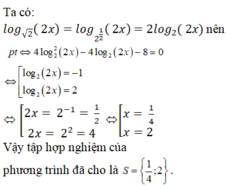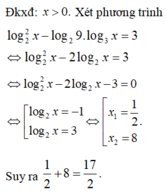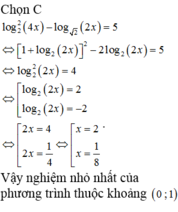
Hãy nhập câu hỏi của bạn vào đây, nếu là tài khoản VIP, bạn sẽ được ưu tiên trả lời.


ĐKXĐ: \(x>0\)
\(\Leftrightarrow log_2^2\left(2x\right)+log_2\left(2x\right)-log_28-9< 0\)
\(\Leftrightarrow log_2^2\left(2x\right)+log_2\left(2x\right)-12< 0\)
\(\Leftrightarrow\left(log_2\left(2x\right)+4\right)\left(log_2\left(2x\right)-3\right)< 0\)
\(\Leftrightarrow-4< log_2\left(2x\right)< 3\)
\(\Leftrightarrow\frac{1}{16}< 2x< 8\Leftrightarrow\frac{1}{32}< x< 4\)

Chọn D.

Thay các nghiệm của phương trình ban đầu vào các đáp án ta thấy D thoả mãn.

a.
\(y'=\dfrac{2-x}{2x^2\sqrt{x-1}}=0\Rightarrow x=2\)
\(y\left(1\right)=0\) ; \(y\left(2\right)=\dfrac{1}{2}\) ; \(y\left(5\right)=\dfrac{2}{5}\)
\(\Rightarrow y_{min}=y\left(1\right)=0\)
\(y_{max}=y\left(2\right)=\dfrac{1}{2}\)
b.
\(y'=\dfrac{1-3x}{\sqrt{\left(x^2+1\right)^3}}< 0\) ; \(\forall x\in\left[1;3\right]\Rightarrow\) hàm nghịch biến trên [1;3]
\(\Rightarrow y_{max}=y\left(1\right)=\dfrac{4}{\sqrt{2}}=2\sqrt{2}\)
\(y_{min}=y\left(3\right)=\dfrac{6}{\sqrt{10}}=\dfrac{3\sqrt{10}}{5}\)
c.
\(y=1-cos^2x-cosx+1=-cos^2x-cosx+2\)
Đặt \(cosx=t\Rightarrow t\in\left[-1;1\right]\)
\(y=f\left(t\right)=-t^2-t+2\)
\(f'\left(t\right)=-2t-1=0\Rightarrow t=-\dfrac{1}{2}\)
\(f\left(-1\right)=2\) ; \(f\left(1\right)=0\) ; \(f\left(-\dfrac{1}{2}\right)=\dfrac{9}{4}\)
\(\Rightarrow y_{min}=0\) ; \(y_{max}=\dfrac{9}{4}\)
d.
Đặt \(sinx=t\Rightarrow t\in\left[-1;1\right]\)
\(y=f\left(t\right)=t^3-3t^2+2\Rightarrow f'\left(t\right)=3t^2-6t=0\Rightarrow\left[{}\begin{matrix}t=0\\t=2\notin\left[-1;1\right]\end{matrix}\right.\)
\(f\left(-1\right)=-2\) ; \(f\left(1\right)=0\) ; \(f\left(0\right)=2\)
\(\Rightarrow y_{min}=-2\) ; \(y_{max}=2\)

Đáp án C
Dựa vào giả thiết, ta thấy rằng:


đúng.

=> (4) sai. Vậy có 2 mệnh đề đúng.


ĐKXĐ: \(x>0\)
\(\Leftrightarrow log_2^22x+log_2\left(\frac{2x}{8}\right)-9< 0\)
\(\Leftrightarrow log^2_22x+log_22x-12< 0\)
\(\Leftrightarrow-4< log_22x< 3\)
\(\Leftrightarrow\frac{1}{32}< x< 4\)